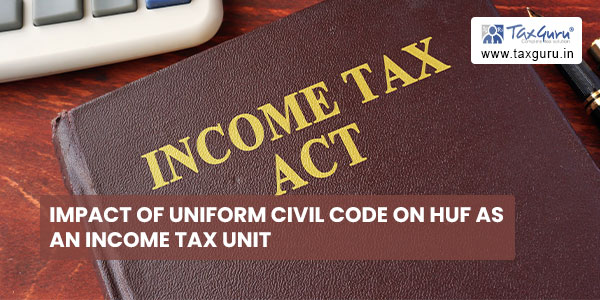Impact of Uniform Civil Code (UCC) on Hindu Undivided Family (HUF) as an income tax Unit
There is growing demand for implementation of Uniform Civil Code (UCC) in India. In addition to other implications, it will also impact the concept of Hindu Undivided Family as an income tax unit. I thought of writing about its implications as and when the UCC is implemented.
The historical reason for introduction of HUF as tax units
Long back when urbanisation had not gripped the country, a single family with many generations used to stay together sharing common roof, food and place of worship. This represented a joint family which also had joint property relationship amongst its members. The family, in most of the cases, owned businesses, run by various members of the family, as a single unit. The concept of HUF is derived from it. Income of the HUF was meant to be available for maintenance and other purposes of the family members. The HUF as a tax unit is not of recent origin. This was already there in Income Tax Act, 1922, the predecessor of the present Income Tax Act of 1961, under which also it has been continued. Under the present tax laws an HUF enjoys its existence, distinct and separate from members who constitute it. Being a separate tax unit, it enjoys a separate tax exemption limit in addition to various tax breaks under Section like 80 C, 80 D, 80 DDB, 112A etc.
What should you do now?
It is not that the UCC will become law overnight. In order to make laws in India, a very long process is followed. First of all, the Law Commission sends a draft of the bill for the proposed legislation with is recommendation to the Ministry of Law & Justice. The ministry in turn weighs the proposals and take its decision. In case the ministry accepts the suggestions of the Law Commission, it places the proposed legislation before the parliament. The bill is discussed in both the houses of parliament and if need is felt, it can even be referred to a select committee for further discussion. After both the houses pass the bill with requisite majority, it is sent to the President for his assent. And it is only after the bill is assented to by the president that it becomes law of the country. So there is a reasonably long journey ahead. So I feel we need not do anything as of now.

Impact of final implementation of Common Civil Code
If the UCC is ultimately implemented, the concept of HUF will have to be given a go be. This may need an amendment in the Income Tax Act if no specific provisions in the UCC on the similar line as contained in the “Kerala Joint Hindu Family System (Abolition) Act, 1975” is made. The above piece of legislation provided that all the institutions of HUF will not be recognised in the state of Kerala after the law is enacted. It also provided that once the law comes into effect no Hindu will be entitled to claim any interest in ancestral property due to his birth in the family. So not only the provisions about rights of persons taking birth after coming into force of UCC but also provisions about existing joint family will have to be made either under the UCC or under the Income Tax Laws. The law may provide that all the assets of erstwhile HUF shall be deemed to have been divided and distributed amongst all the members who are entitled to get a share in the assets of the HUF. The properties cannot be divided in pieces a deemed partition would be assumed and all the members shall hold the immovable property, as tenant in common and a member will become a full-fledged owner for his share of the joint family property.
I presume the law as and when implemented will provide on the similar lines under the tax laws. So the share of income arising to members of the HUF in respect of their share in the HUF asset/properties not divided physically will be included in the income of the respective members.
The above discussion makes it amply clear that the tax payers who have been assessed as HUF need not worry now and should do nothing and wait for the law to come into effect.
Balwant Jain is a tax and investment expert and can be reached on jainabalwant@gmail.com and @jainbalwant on twitter.






Well timed ; points of common concern founded on the attendant fundamentals, as shared by the writer, are not but with every merit. In essence, as of now, the mooted idea of ‘ UCC’ is faulty to the core; might not be possible to be gone ahead with, without a proper and intensive study and in-depth homework, from a multi dimensional angle !
See the other related ongoing discussion and debate on the ill-conceived /misguided concept of ‘ legal heir’ , wprt the dovetailing tax implications ; that is, both under the ‘DT’ and ‘IDT’ law regimes !
we are three member in familly
my self SANDEEP
my wife SUNITA
our daughter ADITI
my wife sunita gupta expired on 11/5/20
now my daughter wantes all assetes of my wife . she go to court for this assetes .
now till court deside qwnership of assetes, how income of my wife assetes be taxable.
During the period court deside the ownership is my wifei.tax return will be filled in her name/PAN by me as repersantitive assesse
Kindly guide.
sandeep